Buying a vending machine can be an extremely profitable move for businesses of all kinds. First of all, it involves a low cost of entry starting at only $150-$400+ per machine plus inventory. If you are smart about the location you place your vending machine and offer popular snacks and drinks, you can ultimately make a huge profit. Plus, you get to offer snacks and drinks to people as they go about their day. It’s a win-win! Before buying your vending machine, you will want to have a plan for the location in order to make the best profit. We recommend considering the factors that determine the best locations, best business types, and best areas for placing your vending machine.
Best Locations for Vending Machines in 2025
Updated for 2025: The global vending machine industry is valued at more than $70 billion, and in 2025, location matters more than ever. Machines placed in high-traffic spots consistently outperform those in average settings. Sometimes earning several times the revenue. At the same time, customer expectations have shifted: people now want cashless and contactless payments along with quick convenience. In fact, 75% of U.S. vending revenue in 2024 came from cashless sales.
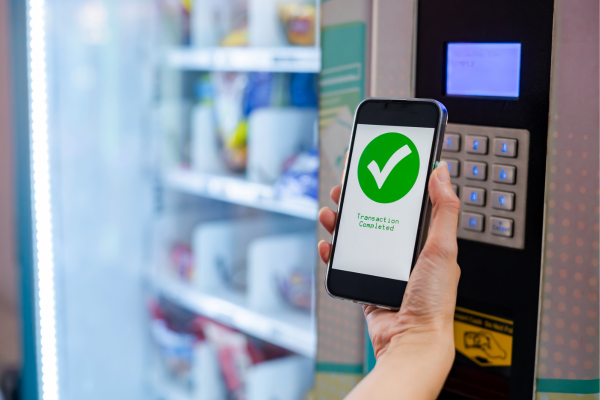
So if you’re buying a machine this year, success isn’t just about stocking the right snacks. It’s about choosing the right place to put your vending machine.
Factors that Determine Best Locations for Vending Machines
When people ask, “What factors determine the best locations for vending machines?” the answer comes down to visibility, accessibility, and demand. A profitable vending machine isn’t just about what you stock. It’s about where you put it and how well the placement fits the needs of the people passing by. Below are the main factors that separate average locations from the most profitable ones.
Foot traffic
Of course, you will want your vending machine to be located in an area where people visit frequently. A vending machine will be the most profitable when it is in a location that tends to get a lot of foot traffic. Think about areas where there will be pedestrians walking by on an everyday basis. The idea is for your vending machine to attract either habitual buyers (who walk past the machine regularly) or impulse buyers (who decide to buy once they see the machine). Either way, you will increase your chances at earning money from the vending machine by placing it in a location where many people will see it.
Outdoors vs. indoors
It’s a good idea to think about placing your vending machine outdoors vs. indoors. On the one hand, outdoors may be a good idea if you offer drinks, as people may want to hydrate while they are outside. On the other hand, if you place your machine in a remote outdoor location where people don’t often visit, you’ll risk losing money on your investment. If you decide to go with an indoor location, make sure it’s a place where people visit regularly. Additionally, it’s a good idea to make sure there isn’t cheaper or more convenient food/drinks located nearby. For instance, if you place your vending machine in an office building that offers food to their employees, you likely won’t generate a significant profit!
Competition
Think about your competition in terms of other food and beverage vendors, as well. For instance, are there other snack and drink vendors nearby? If so, you will want to offer a competitive edge over these vendors. You can price your vending machine items lower than other available snacks and drinks in the area. If there are other vending machines nearby, you consider their product selection, condition, payment options, and prices. For example, if you place a vending machine that is newer, provides exciting options, and allows cashless payments, you may win over more customers compared to other nearby machines.
- Stand out by offering cashless payment options, fresher or healthier items, and reliable stocking. Many older machines still don’t accept mobile pay. Upgrading here can win customers instantly.
Visibility & Security
A vending machine should be impossible to miss. Machines placed in lobbies, entrances, or hallways consistently outperform ones tucked away in a corner. Security matters too: choose well-lit, monitored areas or indoor placements to reduce vandalism and theft.
Accessibility (Convenience)
Convenience drives sales. If a machine is locked away after business hours, you’re missing out. The most profitable vending machine locations are accessible 24/7. Hotels, apartments, and hospitals are prime examples.
Demographics & Needs
Who walks by your machine shapes what sells. College students grab energy drinks and chips between classes, gym-goers look for protein bars, and factory workers want hearty snacks for long shifts. Match your stock to the audience to maximize profit.
All of these factors work together to determine the best locations for vending machines, and getting them right can make the difference between a machine that just covers costs and one that turns a strong profit.
Best Locations for Vending Machines (by Business Type)
The next step to securing the best location for your vending machine is to think about types of businesses where you want to place the machine. Some business locations will definitely be more strategic than others. You want to choose businesses that will naturally generate buyer interest (ie. a location that does not offer food) and have a lot of foot traffic on a day-to-day basis.
Note: You can’t just place your vending machine anywhere without permission! Most locations will require you to follow state and local vending laws. You will often have to sign a contract with the property owner. Make sure to read up on state and local vending laws when doing your research.
Take a look at our list of ideal business types to locate your vending machine.
Amusement parks or festivals
Outdoor areas where people spend lots of time are ideal for vending machines. At an amusement park or festival, groups of people will likely spend hours or all day outdoors walking around. These tend to be good locations for vending machines because many people do not want to pay for overpriced snacks or drinks from nearby vendors. Offering competitively priced snacks and drinks at these outdoor entertainment areas can definitely help you win over buyers.
Hospitals or healthcare facilities
Most healthcare facilities have waiting rooms where patients and family members can wait for long periods of time. Especially at hospitals, many food and drink vendors will shut down at night, but people will be in the waiting rooms 24-hours a day. Adding a vending machine in a waiting room can be a great location. However, keep in mind that you need permission from the healthcare facility before you can place your vending machine there.
Indoor or outdoor shopping malls
Many people spend all day at an indoor or outdoor shopping mall and eventually want a snack or drink. While there are often food courts at malls, your vending machine can spark interest for people who just want something quick and on-the-go. Also keep in mind that many people will not want to pay food court prices. Additionally, there are retail store employees who might also utilize your vending machine regularly.
Schools and universities
Schools are a great place for vending machines because kids often want a snack during their school day! Whether kids want a snack or drink between classes or don’t have time for a full meal in college, you will likely attract interest from students on school grounds. Consider adding the machine in the cafeteria, recess or outdoor areas, or near the school’s entryways/exits.
Gyms and fitness centers
Oftentimes, people forget their water bottle on the way to their workout! Others may be hungry after finishing their workout. Adding a vending machine to a fitness center lobby can be very strategic, especially if you add fitness-oriented products. Consider stocking your machine with water, sports drinks, healthy snacks, and protein bars.
Apartment buildings
Apartment buildings (especially larger ones) are places that contain lots of residents and often do not provide food options! Adding a 24-hour vending machine on-site can be key. Residents will utilize your vending machine when they come and go from the building, when restaurants are closed, or they don’t feel like traveling to get a snack or drink. Consider locating the machine in common areas, nearby the buildings entryways and exits, or near the gym, pool, or laundry room.
Laundromats
When people don’t have on-site laundry at their place of residence, they often have to use a local laundromat. Laundromats are places where people wait around while their clothes are washing/drying, which can get boring! Plus, most people who use laundromats will spend over an hour a week there. This can be a great location for your vending machine, as it can attract both habitual buyers or impulse buyers.
Hotels or lodging areas
Another great location for a 24-hour vending machine is a hotel. There are tons of visitors coming and going on a regular basis, and oftentimes the food at hotels feels overpriced. Plus, people who are lodging might take advantage of your snack and drink options when nearby restaurants close. Vending machines can give them food and drink options around the clock.
Office buildings
Large office buildings will have professionals entering and leaving Monday through Friday. While business professionals will have other options for food, they may want a quick snack or drink while they are working or they may not have time to take lunch. If you are considering an office building as a location for your vending machine, consider whether the building has other food available and what the price is. If you are the only vending machine in the building, or if there are not a lot of food/drink options nearby, you have the opportunity to make a great profit!
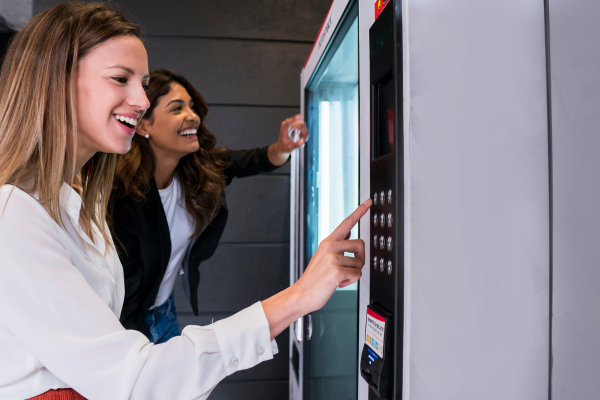
Transportation Hubs (Airports, Train & Bus Stations)
Transportation hubs are some of the busiest public spaces in the world. Travelers often spend hours waiting for flights, trains, or buses, and many don’t want to pay for overpriced food court meals or might find shops closed late at night. Airports and stations also run 24/7, which means your vending machine can bring in revenue around the clock. Stocking machines with bottled water, coffee, energy drinks, or portable snacks is especially effective because passengers look for quick grab-and-go items they can take along on their journey. With thousands of people passing through daily, transportation hubs offer massive visibility and sales potential.
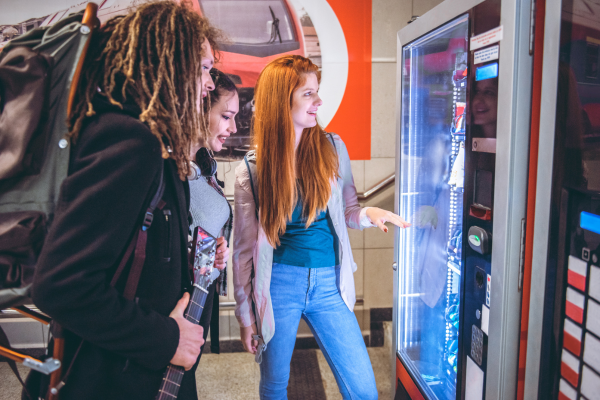
Factories & Warehouses
Factories and distribution centers typically employ large groups of workers on shifts that last eight to twelve hours. Because employees often can’t leave the premises during their breaks, food options are limited. A well-placed vending machine can become the go-to source for snacks, drinks, and even microwavable meals. These locations also tend to have steady, predictable usage because workers take breaks at the same times each day. If you’re able to secure placement in a factory or warehouse, the machine is likely to see consistent, repeat business week after week.
Community Centers & Libraries
Community spaces are gathering places for families, students, older people, and neighborhood groups. While foot traffic may not be as constant as at airports or schools, the visitors who spend time there often stay for hours, attending events, studying, or using facilities. Because many of these centers don’t have on-site food service, a vending machine can provide a convenient, low-cost option for snacks and drinks. Placement near entrances, activity rooms, or study areas ensures that your machine is visible and accessible to people who would otherwise need to leave the building to find refreshments.
Government Buildings (DMVs, Courthouses, City Halls)
Government offices are well known for long lines and waiting times. Whether someone is renewing a driver’s license, attending a court appointment, or handling paperwork, visitors often spend hours on-site with limited access to food or beverages. Vending machines placed in lobbies or waiting areas can generate steady sales from this captive audience. These locations can be more competitive to secure because they are managed by government contracts, but once you obtain approval, they often deliver dependable traffic and revenue.
Movie Theaters & Bowling Alleys
Entertainment venues are another strong option for vending machines. While movie theaters and bowling alleys typically have concession stands, not all guests want to pay premium concession prices or stand in long lines for a small snack or drink. A vending machine offers a fast, affordable alternative, especially for families or younger customers with limited budgets. Smaller, independent theaters and bowling alleys may even welcome vending machines as a way to supplement their food offerings without increasing staff or overhead.
Stadiums & Sports Venues
Stadiums, arenas, and community sports complexes bring together large crowds during games and events, making them high-volume locations. While food concessions dominate during major events, vending machines placed near entrances, exits, or practice facilities can perform well both during and outside event times. Athletes and visitors who use the facilities regularly, for training, practice, or smaller events, provide consistent traffic that helps stabilize revenue in between the big spikes of game days.
Co-Working Spaces
Shared offices and co-working hubs like WeWork, Regus, and local spaces are becoming increasingly popular for professionals and small teams. Unlike traditional offices with cafeterias or stocked breakrooms, these spaces often leave food and beverage access up to the members. A vending machine stocked with coffee, energy drinks, protein bars, or light snacks provides affordable convenience for busy workers who don’t want to leave in the middle of the day. Because co-working spaces often run on flexible schedules, machines here can see steady use outside the traditional 9–5 window.
Once you’ve secured one of these business types, the next question is: where exactly inside the property should your vending machine go? That’s what we’ll cover next.
Best Locations for Vending Machines
The best places to put a vending machine are spots where people naturally gather or pass through, such as lobbies, entryways, and waiting rooms.
In addition to choosing an ideal type of business for your vending machine, you also need to place it in a strategic area within that business location. Remember that your goal is to attract people’s interest as they pass by regularly. Make sure to choose an area where the machine will be easily visible – ideally, an area with the most foot traffic or where people tend to spend the most time.
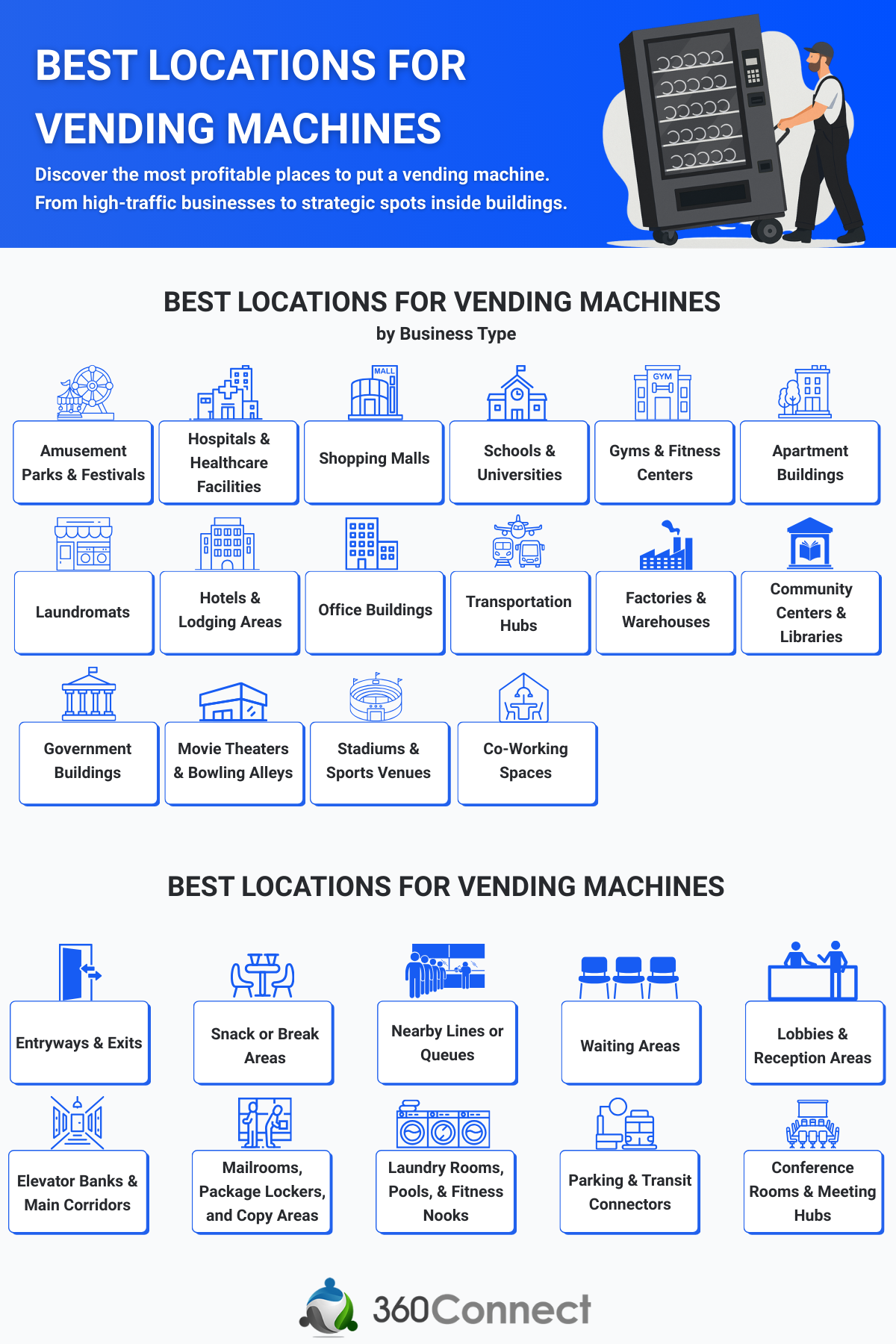
Entryways and Exits
It’s a good idea to place the vending machine near entryways and exits to the business. This will be likely to catch peoples’ eyes because they will see your machine at least twice a day – when entering and leaving. A great place to locate the machine is near a reception desk, lobby, or hallway.
Snack or break areas
If a business has a break area, be sure to consider this as a location for your vending machine. Snack areas are a particularly great location if there is little nearby competition. Think about picnic areas, playgrounds, cafeterias, and other places where people normally take a break and eat at a business.
Nearby lines or queues
If a business typically has a line that forms, consider asking the business to place your vending machine nearby the queue. This is the perfect way to grab buyer interest as they wait in line – they will likely consider purchasing a cheap snack or drink while they wait. For instance, lines at amusement parks or festivals are great locations for vending machines.
Waiting Areas
Similarly, waiting areas are one of the best locations for vending machines. Consider waiting rooms in hospitals or healthcare centers, or waiting areas at bus and train stations, airports, and more.
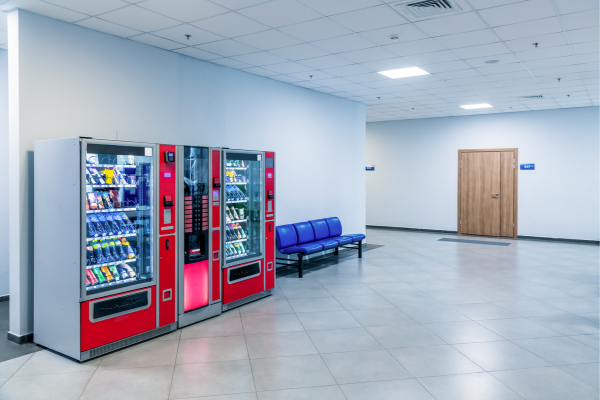
Lobbies & Reception Areas
Lobbies are among the best vending machine spots because every visitor passes through at least once, making your machine impossible to miss. Everyone passes through the lobby. Machines here are visible, trusted, and get consistent daily traffic.
Elevator Banks & Main Corridors
These choke points funnel people past the same spots multiple times per day. High impressions = higher sales.
Mailrooms, Package Lockers & Copy Areas
In apartments or offices, people make daily stops here. A vending machine in these areas becomes a habitual convenience.
Laundry Rooms, Pools & Fitness Nooks (within apartments/hotels)
These areas keep residents onsite for long stretches. Machines here benefit from “while I wait” purchases.
Parking & Transit Connectors
Pathways between parking lots, bus stops, or entrances catch commuters on the go. Machines in these spots encourage “grab-and-go” purchases.
Conference Rooms & Meeting Hubs (within offices or co-working spaces)
Meetings run long, and participants want easy access to drinks and snacks without leaving the building.
Frequently Asked Questions: Vending Machine Location
Final Thoughts
Choosing the right location is the single biggest factor in vending machine success. The top vending machine locations all share the same traits: high visibility, constant traffic, and a built-in demand for convenience. Whether you’re placing machines in schools, hospitals, offices, or apartment complexes, keep in mind both the business type and the specific spot inside the building. A machine tucked away in a dark hallway won’t perform the same as one near a busy lobby or entryway.
In short: location is profit. Get it right, and your vending machine can deliver steady, long-term income.
Related: Most Popular Snacks and Drinks for Vending Machines, How Much is a Vending Machine?
Need a Vending Machine?
Ready to put your vending machine in a profitable location? Whether you’re just getting started or looking to expand, we can help you compare suppliers and pricing.
Want to compare prices on a vending machine service? Simply use our free form to compare up to 5 quotes from suppliers in your area!

